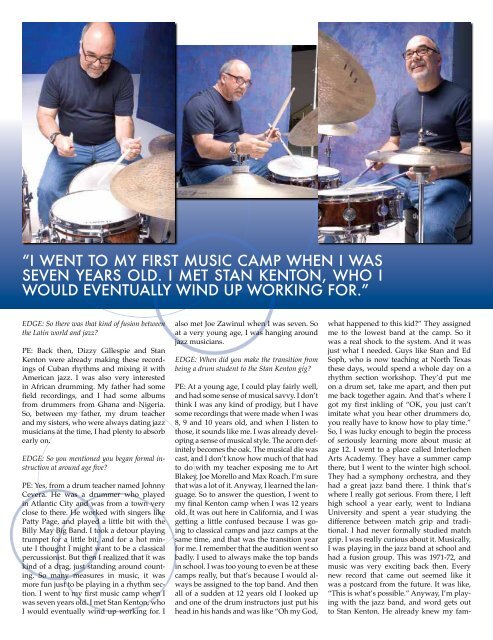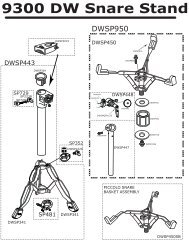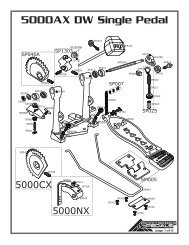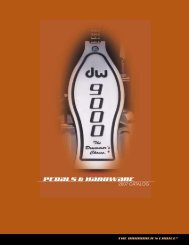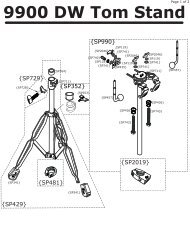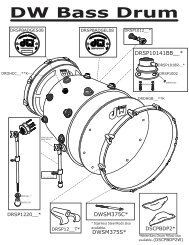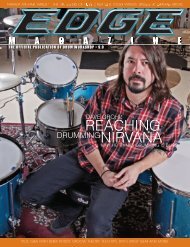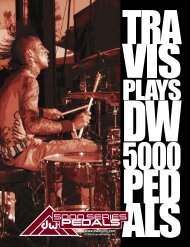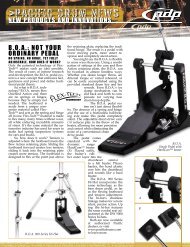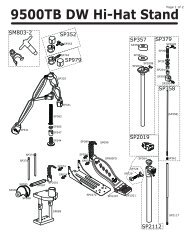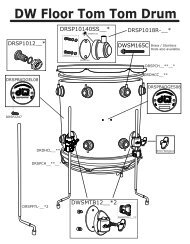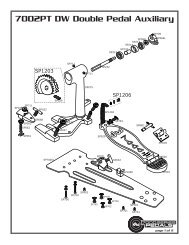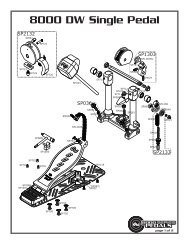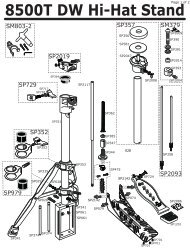Edge 7.0 featuring Peter Erskine & Alex Acuña here - Drum Workshop
Edge 7.0 featuring Peter Erskine & Alex Acuña here - Drum Workshop
Edge 7.0 featuring Peter Erskine & Alex Acuña here - Drum Workshop
- No tags were found...
Create successful ePaper yourself
Turn your PDF publications into a flip-book with our unique Google optimized e-Paper software.
“I went to my first music camp when I wasseven years old. I met Stan Kenton, who Iwould eventually wind up working for.”EDGE: So t<strong>here</strong> was that kind of fusion betweenthe Latin world and jazz?PE: Back then, Dizzy Gillespie and StanKenton were already making these recordingsof Cuban rhythms and mixing it withAmerican jazz. I was also very interestedin African drumming. My father had somefield recordings, and I had some albumsfrom drummers from Ghana and Nigeria.So, between my father, my drum teacherand my sisters, who were always dating jazzmusicians at the time, I had plenty to absorbearly on.EDGE: So you mentioned you began formal instructionat around age five?PE: Yes, from a drum teacher named JohnnyCevera. He was a drummer who playedin Atlantic City and was from a town veryclose to t<strong>here</strong>. He worked with singers likePatty Page, and played a little bit with theBilly May Big Band. I took a detour playingtrumpet for a little bit, and for a hot minuteI thought I might want to be a classicalpercussionist. But then I realized that it waskind of a drag, just standing around counting.So many measures in music, it wasmore fun just to be playing in a rhythm section.I went to my first music camp when Iwas seven years old. I met Stan Kenton, whoI would eventually wind up working for. Ialso met Joe Zawinul when I was seven. Soat a very young age, I was hanging aroundjazz musicians.EDGE: When did you make the transition frombeing a drum student to the Stan Kenton gig?PE: At a young age, I could play fairly well,and had some sense of musical savvy. I don’tthink I was any kind of prodigy, but I havesome recordings that were made when I was8, 9 and 10 years old, and when I listen tothose, it sounds like me. I was already developinga sense of musical style. The acorn definitelybecomes the oak. The musical die wascast, and I don’t know how much of that hadto do with my teacher exposing me to ArtBlakey, Joe Morello and Max Roach. I’m surethat was a lot of it. Anyway, I learned the language.So to answer the question, I went tomy final Kenton camp when I was 12 yearsold. It was out <strong>here</strong> in California, and I wasgetting a little confused because I was goingto classical camps and jazz camps at thesame time, and that was the transition yearfor me. I remember that the audition went sobadly. I used to always make the top bandsin school. I was too young to even be at thesecamps really, but that’s because I would alwaysbe assigned to the top band. And thenall of a sudden at 12 years old I looked upand one of the drum instructors just put hishead in his hands and was like “Oh my God,what happened to this kid?” They assignedme to the lowest band at the camp. So itwas a real shock to the system. And it wasjust what I needed. Guys like Stan and EdSoph, who is now teaching at North Texasthese days, would spend a whole day on arhythm section workshop. They’d put meon a drum set, take me apart, and then putme back together again. And that’s w<strong>here</strong> Igot my first inkling of “OK, you just can’timitate what you hear other drummers do,you really have to know how to play time.”So, I was lucky enough to begin the processof seriously learning more about music atage 12. I went to a place called InterlochenArts Academy. They have a summer campt<strong>here</strong>, but I went to the winter high school.They had a symphony orchestra, and theyhad a great jazz band t<strong>here</strong>. I think that’sw<strong>here</strong> I really got serious. From t<strong>here</strong>, I lefthigh school a year early, went to IndianaUniversity and spent a year studying thedifference between match grip and traditional.I had never formally studied matchgrip. I was really curious about it. Musically,I was playing in the jazz band at school andhad a fusion group. This was 1971-72, andmusic was very exciting back then. Everynew record that came out seemed like itwas a postcard from the future. It was like,“This is what’s possible.” Anyway, I’m playingwith the jazz band, and word gets outto Stan Kenton. He already knew my familybecause my family always brought me tothese camps. At that age, I was always tooyoung to come on my own. So he called,and my father answered the phone, andsaid “Fred, this is Stan, is <strong>Peter</strong> ready for theband?” My dad said, “Yeah.” And Stan said,“OK, well then, we’d like him to come on upand audition.” So my audition was at LincolnCenter, and I had just turned 18. Theywere rehearsing for the Newport Jazz Festivalthat night, and part of the program wasan appearance by June Christy, a vocalistthat had been with the band back in the ‘40s.She was going to sing with the band andonly the rhythm section knew I was auditioning,so the rest of the band didn’t knowthat t<strong>here</strong> was going to be a change. So theyall assumed that I was June Christy’s hippiedrummer. Got the gig, and a week later,I’m out riding in this bus. Funny thing wasthat I’d been with the band for a few days,and after a gig somew<strong>here</strong> in Iowa, I’m ridingthe elevator up with Stan. We’re going toour respective floors, and he said, “<strong>Peter</strong>, wehaven’t discussed money yet.” And I said,“OK, how much do you want?” I think thatwas good for an extra $25 a week. He wascharmed by that response. Imagine, you’re18 years old, and you get to go on the roadand play. It wasn’t about the money; it wasabout getting to play.EDGE: Was going on the road at such a youngage a shock to the system?PE: It just seemed natural. I knew I was doingmy learning in public, and I sensed thata lot of drummers were thinking, “Who’sthis guy, and why did he get the gig?” Atthe time, that was a pretty plump gig. If youwanted to play big band, that was a goodgig. And I experienced a lot of the samething in Weather Report. “Who’s this guy?He played big band. What qualifies him toplay with Weather Report?” Even in SteelyDan in ’93, I kinda got that. I’m finally atthat stage of my life w<strong>here</strong> if that questioncomes up, it doesn’t bother me.EDGE: So then it was Maynard Ferguson, andthen on to Weather Report?PE: After three years with Kenton, I wentback to college and my professor GeorgeGabber. He just took one look at my handsand said, “We’ve got a lot of work to do.”I had gained a ton of bad habits out on theroad. I was playing so heavy. So I spent theyear trying to unlearn some of the bad habits.During that time, Maynard called threetimes, and I turned him down every time.Finally they called and they said, “Lookwill you just do the summer tour?” And Isaid, “OK,” but I really wasn’t looking togo out again. Then I spent two years withMaynard, and during that time I met JacoPastorius. He came outto see the band. I didn’tknow it at the time, butthey were looking aheadto when <strong>Alex</strong> might besplitting the group. SoJaco filed me away. Initiallythey had called meto come and work on thisnew album, and I onlyhad a couple of days offwith Maynard. It was justtoo much pressure forme. They wanted me togo out t<strong>here</strong> for only one day. My recordingexperience wasn’t that good, and I didn’twant to risk missing a Maynard gig. Plus,the weather was bad, and I didn’t reallywant to fly, and I didn’t have the confidenceat the time, so I turned it down. Luckily,they called a second time, and I had enoughsense to not turn it down. Then, they askedif I could do a tour of Japan. So, I said yes,and I told Maynard I would be leaving, butthe band still wasn’t quite sure. Zawinuldidn’t know that much about me. All heknew is that Jaco had recommended me. Sohe had management call me up. I was 23,and the guy says, “<strong>Peter</strong> this is so-and-sofrom Weather Report management. Joe Zawinulwanted us to ask you one final question.”I said, “Sure, what is it?” “Joe wantsto know if you can play the beat to ‘NubianSundance.’” That’s a tune from the MysteriousTraveler album. It’s a cool beat. We usedto play it in Maynard’s band at sound checksjust because I liked it. So, with the brashnessof a young 23-year-old, I just blurted out,“Yeah, you tell Joe I can play the sh*t outof it.” And the guy said, “OK, thank you.”Of course that was the kind of answer thatZawinul loved because they wanted a guyto come in with attitude. At the time, theymade a new kit for this Weather Report tour,with cases and the whole nine yards. So Iflew out to Hollywood for the rehearsal. I’mat S.I.R. and we’re supposed to start at like1:00, so I’m t<strong>here</strong> at like 10 in the morning,and I’m setting up this new drum set. Theroad manager comes over and says, “Theguys called, they’re going to be a couple ofhours late.” “Okay.” A couple hours later, hecomes up again: “Um, they’re going to be acouple more hours.” I don’t know what theywere doing. I never found out. But about sixhours later, these guys come strolling in.Wayne Shorter, Joe and Jaco. Joe looks at mevery wearily, and shakes my hand. Wayneshakes my hand friendlier. Jaco waves Hiand runs out the door again. He went togo get a six-pack of Heineken. So, now I’mwondering what’s going on. Normally, Iwould have waited until I was asked, “OK,<strong>Peter</strong>, do you want to play this song?” As faras I knew, it wasn’t an audition, it was justa rehearsal, but thinking back, I’m sure this> On theRecord:<strong>Alex</strong> Acuña:EDGE: Talk about <strong>Peter</strong>’s playingwith Weather Report. How did youfeel about him being in the bandafter you?<strong>Alex</strong> Acuña: I left the band becausefamily has always been ahigh priority, and I wanted tobe with my children and my wife. Theband was taking off, so I said “Oh I can’tgo on the road for three or four monthswithout seeing my family. I can’t dothat. I have to be <strong>here</strong>.” They understood,and we split on great terms. I stillcontinued to play with Wayne and Joeon some of their solo records, and I eventoured with Joe a bit <strong>here</strong> and t<strong>here</strong>. Soright after that, the band came to play<strong>here</strong> live at Santa Monica Civic. I cameto see them. I got a ticket, and I wentby myself. Wow, it was weird becauseI was so used to being part of the music,and now I was just in the audience.After the show, Joe gave me the new recordwith <strong>Peter</strong> playing. Man! I droveso fast to my house to play it. I wantedto see how the record sounded, youknow? So I read who was playing onthe album. Guys like Steve Gadd, TonyWilliams and <strong>Peter</strong>. When I heard thistrack called “Pinocchio,” I said, “Wow!I admire <strong>Peter</strong>.” I hadn’t heard a recordingof <strong>Peter</strong> before that. I heard him live,but it’s a different thing when you heara record; you hear the entire nuance.Later on, I became friends with <strong>Peter</strong>,and I still listen to all of the music thathe recorded with Weather Report. I alsolisten to Steps Ahead and other recordingshe’s done with Vince Mendoza andthe big bands in Europe. Amazing stuff!Lately, we’ve been doing a lot of moviestogether. I respect <strong>Peter</strong> for many reasons.As a human being, he’s amazing!As a musician and drummer, also tremendous!I think he’s one of the leadingdrummers in the style of music that he’splaying. He can play anything. I sawhim playing Latin jazz, and he playspop, too. I loved him with Steely Dan.He has incredible taste, time, technique,and his cymbal work is impeccable.He’s one of a kind, and we’ve alwaysbeen great friends. Weather Report wasour link, but we have so much in commonbeyond that.[EDGE <strong>7.0</strong>] 5


